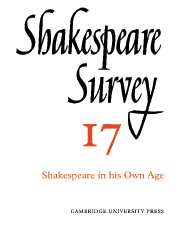Book contents
- Frontmatter
- THE DAILY LIFE
- 1 London and the Court
- 2 Provincial Life
- 3 Sailors and the Sea
- 4 Elizabethans and Foreigners
- 5 Education and Apprenticeship
- 6 The Law and the Lawyers
- 7 London’s Prisons
- PHILOSOPHY AND FANCY
- 8 The Commonwealth
- 9 Dissent and Satire
- 10 Scientific Thought
- 11 Medicine and Public Health
- 12 The Folds of Folklore
- 13 Symbols and Significances
- ART AND ENTERTAINMENT
- 14 Actors and Theatres
- 15 The Printing of Books
- 16 Music and Ballads
- 17 The Foundations of Elizabethan Language
- Notes
- Index
- Plate section
16 - Music and Ballads
Published online by Cambridge University Press: 28 March 2007
- Frontmatter
- THE DAILY LIFE
- 1 London and the Court
- 2 Provincial Life
- 3 Sailors and the Sea
- 4 Elizabethans and Foreigners
- 5 Education and Apprenticeship
- 6 The Law and the Lawyers
- 7 London’s Prisons
- PHILOSOPHY AND FANCY
- 8 The Commonwealth
- 9 Dissent and Satire
- 10 Scientific Thought
- 11 Medicine and Public Health
- 12 The Folds of Folklore
- 13 Symbols and Significances
- ART AND ENTERTAINMENT
- 14 Actors and Theatres
- 15 The Printing of Books
- 16 Music and Ballads
- 17 The Foundations of Elizabethan Language
- Notes
- Index
- Plate section
Summary
'Marvellous sweet music'
We know that the role of music in Elizabethan life was far from negligible, yet to assess its significance in that golden age is difficult since the conditions governing twentieth-century attitudes and requirements are so distinct from the earlier epoch. Our historical knowledge permits us to avoid some of the pitfalls of exaggerating or minimizing the importance of music in the life of the average Elizabethan, and a famous quotation from Thomas Morley's Plain and Easy Introduction to Music may serve for orientation:
But supper being ended and music books (according to custom) being brought to the table, the mistress of the house presented me with a part earnestly requesting me to sing; but when, after many excuses, I protested unfeignedly that I could not, every one began to wonder; yea, some whispered to others demanding how I was brought up....
This passage is frequently quoted to prove that the art of singing was cultivated with equal zeal in every grade of social rank, though recent scholarship is inclined to hold that Morley had good reason to exaggerate the social advantages of musical capability. He was, after all, not only the author of a textbook on music, but also a prolific composer. Moreover, about this time he was petitioning Queen Elizabeth for a patent granting him the monopoly to print music, a suit in which he was successful in 1598. To assume, then, that the average Elizabethan could read at sight the part of a madrigal or other music set in parts would give an unrealistic picture of the age. Before we bewail the imperfections of the twentieth century we are bound to admit that there is little evidence to show that the number of musically literate laymen of our own time is substantially below that present in the reign of Queen Elizabeth.
- Type
- Chapter
- Information
- Shakespeare Survey , pp. 214 - 222Publisher: Cambridge University PressPrint publication year: 1964
- 1
- Cited by

